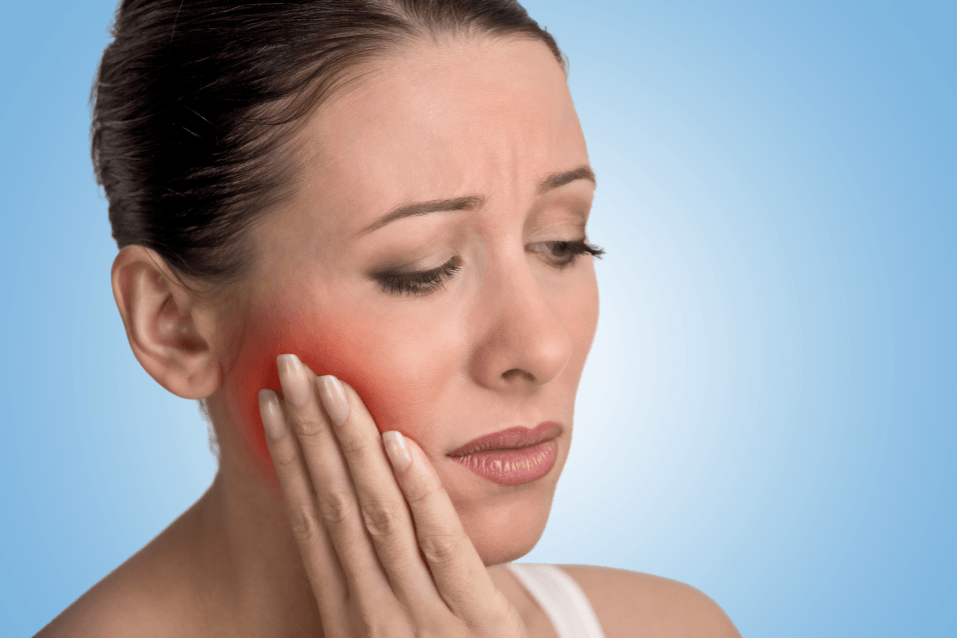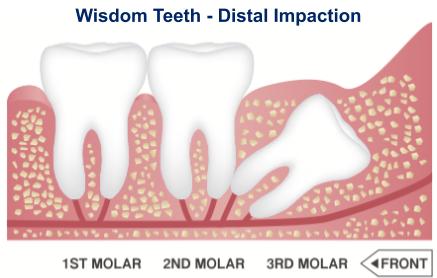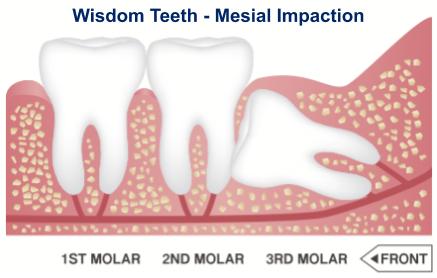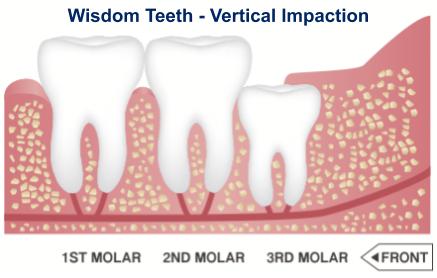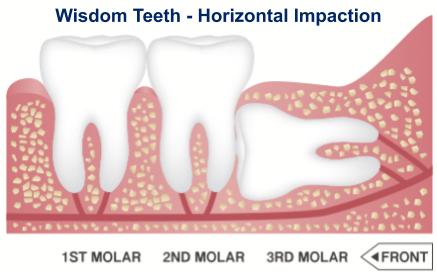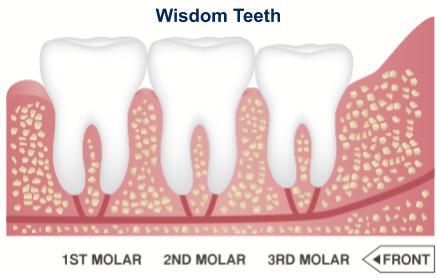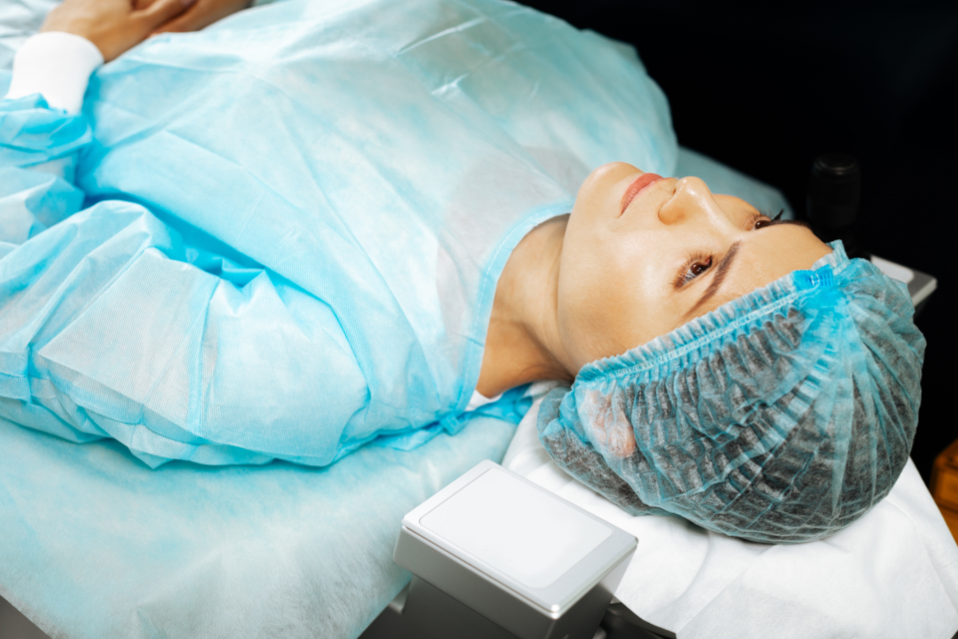Wisdom Teeth Removal
What are Wisdom Teeth?
Wisdom teeth are the last adult teeth to develop and are also known as third molars. Most adults develop four wisdom teeth with two in the top jaw (maxilla) and two in the lower jaw (mandible).
Not all adults develop four wisdom teeth. Some adults may develop none, one, two or three and in rare cases even more than four.
Wisdom teeth usually attempt to erupt into the mouth between the ages of 17 and 25 and when this is not the case the wisdom teeth may be impacted in the soft tissues or bones of the jaws.
Why should your Wisdom Teeth be removed?
Research has shown that the majority of wisdom teeth will need to be removed during your lifetime so the decision to remove them is made by balancing the risks of removal versus the benefits of removing the wisdom teeth. It is important to know that some wisdom teeth can develop normally and erupt into the mouth in a functional, useful position.
There are many reasons to advise wisdom teeth removal and these include painful conditions, painless conditions, and some occupations and social circumstances where prophylactic/preventative removal is advised.
- Recurrent infection or pain (Pericoronitis)
- Dental Caries (Decay)
- Gum Disease (Periodontal Disease)
- Resorption of Adjacent Molar or to protect from this occurring (Resorption)
- Impacted wisdom teeth
- Cysts or Tumours associated with the Wisdom Teeth
- Food Trapping
- Ulceration
- Pre-Orthodontic Treatment
- Pre-Orthognathic Surgery
- Pre-Military Deployment
At your initial consultation, Dr John Webster will discuss the reason you have been referred for wisdom teeth removal, review your medical history and xrays with you, and then discuss the risks and benefits of wisdom teeth removal before tailoring a treatment plan for your individual circumstance.
When should your Wisdom Teeth be removed?
If it is advised to remove the wisdom teeth, then the ideal time to remove them is usually in the late teenage years before the roots of the wisdom teeth have fully developed into a position where there can be increased risk to the inferior dental nerve. This nerve is a purely sensory nerve that detects sensation from the lower teeth and the lower lip/chin skin.
Should the roots already be fully developed then the next ideal time is before 30 years of age. After this time the bone around the impacted wisdom teeth becomes dense making the wisdom teeth removal more difficult and the risks associated with type of surgery increases.
Young people also benefit from faster healing and better nerve recovery so removal in the late teenage years is the lowest risk time for wisdom teeth removal.
Are there any risks of Wisdom Teeth removal?
The risks of wisdom teeth removal are unique to each individual patient and are affected by the age of the patient, the length and development of the wisdom tooth roots, the reason for removal, the location or depth of impaction in bone, the closeness to the inferior dental nerve to the wisdom tooth in the (lower jaw), the closeness of the maxillary sinus to the wisdom tooth in the upper jaw (maxilla) and the previous medical history of the individual.
The risks of wisdom teeth removal are minimised by thorough patient assessment, review of x-ray images (OPG) and in some cases 3D CT imaging, and the use of best practice surgical techniques and equipment. A consultation with a Specialist Oral and Maxillofacial Surgeon is highly recommended before wisdom teeth removal to ensure all risk minimisation is achieved.
Who should perform your Wisdom Teeth removal?
The decision of who should perform wisdom teeth removal is ultimately up to each individual patient to decide. The difficulty and risks associated with each individual wisdom tooth should be clear to the patient after the initial consultation.
The experience, complication rate and ability to manage complications of the treating Dentist or the Specialist Oral and Maxillofacial Surgeon should also be clear to the patient after the initial consultation.
In some cases wisdom teeth removal can also be safely performed by Dentists under local anaesthetic and Dr John Webster regularly educates and teaches case selection and risk minimisation to Dentists across various platforms. Should you have a complication following wisdom teeth removal by a Dentist, Dr John Webster is available for consultation and emergent care as requested by the treating Dentist, as even the simplest cases of wisdom teeth removal still have low risks of complications.
In many cases wisdom teeth removal is advised under the expertise of a Specialist Oral and Maxillofacial Surgeon either under local anaesthetic (patient awake) at the Oral Facial & Implant Centre or under general anaesthesia (patient asleep) in a hospital or day surgery setting. This is because a Specialist Oral and Maxillofacial Surgeon is dual qualified with a Medical & Surgical Degree and Dental Degree and has performed thousands of wisdom teeth removals during training/post training.
As part of completion of the Specialist Oral and Maxillofacial Surgery training each surgeon must pass detailed theory exams to be able to identify the risks for each patient and surgical techniques to minimise risk for each individual patient. A Specialist Oral and Maxillofacial Surgeon is also trained to manage and care for any complications that do arise as a result of wisdom teeth removal meaning the patient is in the most experienced hands possible from initial consultation through to complete healing.
What are the costs of your Wisdom Teeth removal?
A patient should consider the cost of wisdom teeth removal which includes the cost of the initial procedure quoted (estimate of fees) and also be made aware of the cost of managing any complications, post surgery, that may arise. Dr John Webster, through his extensive training and experience as a Specialist Oral and Maxillofacial will endeavour to minimise the risk of complications through the use of modern and minimally invasive techniques including scalpel-free and drill-free options where deemed suitable.
Dr John Webster’s surgical fee for each wisdom tooth removal procedure is considered reasonable and competitive irrespective of his specialist qualifications. The surgical fee varies from $350 to $650 per tooth and is correlated to the surgical time anticipated and equipment required. The average surgical fee for surgical removal of four impacted wisdom teeth is approximately $2300.
The diagram above shows different lower jaw impacted wisdom teeth and highlights that some teeth are close to the surface and are positioned in such a way they will likely be easier to surgically remove. Other wisdom teeth are lying down horizontal along the nerve or crossing the nerve or even facing the wrong direction. All of these cases will require more time to surgically remove bone and divide the tooth into small sections that can be safely removed without traumatising the associated inferior dental nerve or adjacent healthy dentition.
Wisdom teeth removal can be completed under local anaesthetic (patient awake) at the Oral Facial & Implant Centre or under general anaesthetic (patient asleep) in a hospital or day surgery setting depending on the clinical difficulty of the removal and the individual financial circumstances of the patient.
Should you wish to undergo treatment with a general anaesthetic there will be an additional fee incurred with the hospital/day surgery and the Specialist Anaesthetist all of which will be discussed at the initial consultation and clearly explained where Medicare and Health Fund rebates may apply.
Please contact our friendly reception team if you require further information on 07 4580 4733..
Where can your Wisdom Teeth removal be performed?
Dr John Webster is accredited at numerous locations across Toowoomba, the Darling Downs and Queensland including St Andrew’s Hospital, St Vincent’s Hospital, Toowoomba Surgicentre and Lady Bjelke-Petersen Community Hospitals.
Surgical wisdom teeth removal can be performed under local anaesthetic (patient awake) at the Oral Facial & Implant Centre or under general anaesthetic (patient asleep) at any of the hospitals or day surgeries listed above.
What is your journey on the day of surgery?
If you are having wisdom teeth removal under a local anaesthetic (patient awake) at our conveniently located practice, Oral Facial & Implant Centre based within St Andrew’s Hospital Specialist suites, then we recommend eating something prior to the procedure. You will be able to drive yourself home after a short period following the procedure (with Dr Webster's approval for departure).
If you are having a general anaesthetic (patient asleep) in a hospital or day surgery, you should have nothing to eat or drink for 6 hours prior to surgery. Small sips of water are allowed up to 2 hours prior to surgery.
You will need time prior to the surgery time to arrange the admission paperwork and safety checks prior to entering the theatre with total time from admission, to theatre for surgery, to recovery area post surgery, to discharge home is, on average, 3 hours.
You will not be permitted to drive home following general anaesthesia. Please arrange for someone to collect you from the hospital/day surgery centre and care for you for 24 hours post surgery (i.e. after a general anaesthetic).
Are there any post-operative instructions?
At the initial consultation with Dr John Webster you will be provided with a set of pre and post-operative instructions that are evidence-based to optimise healing and to minimise discomfort, pain and complications during the recovery phase.
How can you book in for your Wisdom Teeth removal consultation?
If you would like to know how we can help you further, or to book a no obligation initial consultation please phone 07 4580 4733
or alternatively request an appointment online.

